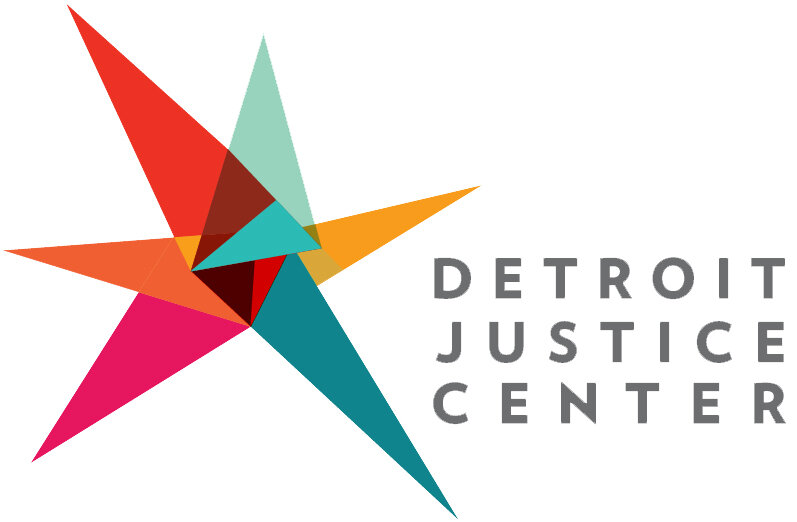Detroit Justice Center Pilots Program to Fight Illegal Tax Foreclosures
Community Legal Workers Will Assist Low-Income Residents in Appealing Taxes
In November 2018, Detroit Justice Center (DJC) brought on four Community Legal Workers (CLWs) to help Detroiters avoid tax foreclosure. Our CLWs are parents, teachers, students, activists, and advocates who are committed to guiding Detroiters through the complex tax assessment appeals process this February. DJC aims to assist 150 households through this pilot program.
What Are Community Legal Workers?
The Community Legal Worker pilot aims to put law into people’s hands, and to provide free assistance to those most vulnerable to foreclosure by increasing outreach to Detroit’s neighborhoods. This pilot program will also help develop systems and best practices for future assessment periods. Since last year, DJC has worked closely with Namati, an international legal organization that has pioneered the use of community paralegals in 160 countries, to devise this community legal worker pilot to tackle justice gaps in Detroit.
Who Are the Community Legal Workers?
CLWs are formally trained and supervised by DJC’s legal staff and are prepared to help people navigate government systems. Many of the CLWs have worked with groups like the Coalition to End Unconstitutional Tax Foreclosures and Detroit People’s Platform, focusing on issues of economic justice. One of our CLWs has personally dealt with property tax foreclosure, and she is determined to make the appeals process easier so that her fellow Detroiters will not face similar circumstances.
After helping Detroiters navigate tax assessment appeals this winter, the CLWs will tackle other issues including water shutoffs and, possibly, criminal record expungement.
What is the Issue?
Unconstitutional property tax assessments have led to foreclosure of between 25 and 30% of Detroit households and Detroiters’ only opportunity to appeal their property tax assessments happens during a two-week window between February 1st and 15th.
Between 2011-2015, a crisis arose in Detroit when roughly 100,000 properties were foreclosed on for unpaid property taxes. There are approximately 385,000 properties in the city, which means over 25% of the city was foreclosed on in a five-year period. Additionally, Mayor Mike Duggan has admitted to the over-assessment of Detroit residential properties in violation of the Michigan Constitution. This combination of factors, simply put, has compounded the crisis, leaving up to an estimated 30% of Detroit residents in a situation where they have been foreclosed on illegally. [1]
The Auditor General examined the Assessment Division and reported inadequate staffing, ineffective data management, and inefficient assessing activities. This lack of sufficient assessments has led to inaccurate property tax bills across Detroit and contributed to the already systemic foreclosure crisis. The Auditor General’s report prompted the State Tax Commission to take over the Assessment Division and conduct the first citywide residential property reappraisal in 60 years. Unfortunately, the Duggan administration has asserted that the city assumes no liability for damages related to the unconstitutional assessments. [2]
How Can People Access These Services?
Call the toll-free hotline: 833-200-0093
Email the Community Legal Workers: clw@detroitjustice.org
For more information or to set up an interview with the Community Legal Workers, contact DJC’s Communications Officer Casey Rocheteau at crocheteau@detroitjustice.org
***************************************************************************************************************
[1] Coalition to End Unconstitutional Tax Foreclosures. “Long-term Solution to Unconstitutional Property Tax Assessments.” Memo to The Foundation Community. 17 August, 2018. Email. 1.
[2] Id 2-3
Dates to Watch:
-
Nov. 6—8: Community Legal Worker Training at Detroit Justice Center
-
Before Jan. 1 2019: Board of Assessors Review can take into account structural defects, fire damage or demolition of property
-
Jan. 1, 2019: DJC’s Community Legal Workers begin helping Detroiters with property tax appeals process.
-
Feb. 1-15: February Assessors Review (to appear before the Board of Review an appeal must be made during this time)
-
March 2: All applicants who are not satisfied with Feb. Assessors Review must write the Board of Review on or before this date.
-
March 5—April 1: March Board of Review appeal must be received by March 11. Anyone wishing to protest their assessments must do so at this time in order to qualify to appeal to the Michigan Tax Tribunal.
-
March 11, 2019: Board of Assessors must complete reviews and issue all decisions by this date.
-
April 1,2019: March Board of Review issues all decisions and submits assessments to the county by April 3.
-
June 30: Protest at the Board of Review is necessary to protect your right to further appeals to the Michigan Tax Tribunal for valuation and exemption appeals and/or State Tax Commission for classification appeals. To appeal a decision of the Board of Review you must write to the Michigan Tax Tribunal by this date


